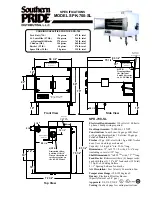
21
Hints and tips
•
Arrange the shelves in the required
positions before switching the oven on.
Shelf positions are numbered from the
top downwards.
•
Ensure that food is placed centrally on
the shelf and there is sufficient room
around the baking tray/dish to allow for
maximum circulation.
•
Do not push dishes too far back as food
will burn if it overhangs the burner flame.
•
Stand dishes on a suitably sized baking
tray on the shelf to prevent spillage onto
the oven base and to help reduce
cleaning.
•
The material and finish of the baking tray
and dishes used affect base browning.
Enamelware, dark, heavy or non-stick
utensils increase base browning. Shiny
aluminium or polished steel trays reflect
the heat away and give less base
browning.
•
When cooking more than one dish in the
oven, place dishes centrally on different
shelves rather than cluster several
dishes on one shelf, this will allow the
heat to circulate freely for the best
cooking results.
•
If you are cooking more than one tray of
similar items, for example cakes or
biscuits, swap the trays during cooking
or you can remove the top tray when the
food is cooked and move the lower tray
to the higher shelf to finish cooking.
•
Do not place baking trays directly on the
oven base as it interferes with the oven
air circulation and can lead to base
burning; use the lower shelf position.
Do not place cookware and cooking
pots with rough bases e.g. cast iron
on the oven door as damage to the
glass may occur.
















































